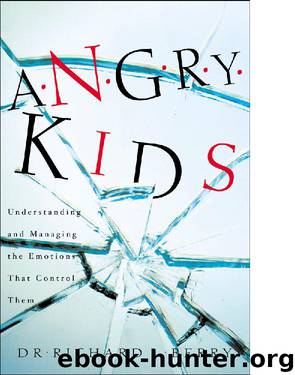Angry Kids by Dr. Richard L. Berry

Author:Dr. Richard L. Berry
Language: eng
Format: epub
Tags: FAM034000, PSY013000
Publisher: Baker Publishing Group
Published: 2013-06-12T16:00:00+00:00
* * *
* * *
Parental Plan
* * *
Evaluate Current Solutions
Identifying and evaluating the specific solution being used is sometimes enough to bring about change. John had locked onto a solution that accomplished his main goal, but at a great cost to other areas of his life. When a goal becomes extremely important, it usually limits a person’s flexibility because he doesn’t want to risk not achieving the goal. John wanted to be with his friends because he finally was receiving the affirmation he desperately needed. At this point in his life, being popular was crucial. He focused only on what he wanted to do and what his parents needed to do to help him, refusing to look at what he could do to help himself. Helping adolescents shift their focus usually requires: 1. having parents give a clear message about the proposed solution, and 2. finding ways to empower the child to take charge of what he wants (in a positive way).
John’s parents were hesitant to tell John they would never give him free rein with his friends because they didn’t want to risk his becoming angry and sneaking out even more. But with my encouragement they told John clearly and firmly they would not give him complete control of his free time. He responded quite angrily! But with this option gone he is more likely to move to exploring other options, because he still wants to be with his friends.
Most adolescents want to be in charge of their life because they “know everything” and are invincible. They usually respond if I can find a way to empower them. I often point out they could get more of what they want if they: 1. put themselves in the best possible position to negotiate, and 2. present a workable plan. Doing so gives them power over their situation and moves it beyond the impasse.
While this conversation didn’t immediately lead to a shift in the solution John used, it did cause him to think more specifically about the solution he’d adopted. Having to own an imperfect solution by identifying it and saying it out loud creates mental friction. This motivated John to come up with another solution that encompassed more of his goals.
Interestingly, the parents were also locked onto a specific solution because of the importance of their goal of keeping John safe and getting him into college. Clearly, both sides were trying to meet important, understandable needs. The problem lies in the solutions, not in the needs.
Use the following questionnaire to help your child evaluate his solution:
Solution Evaluation
Problem. Specifically state the problem:
Download
This site does not store any files on its server. We only index and link to content provided by other sites. Please contact the content providers to delete copyright contents if any and email us, we'll remove relevant links or contents immediately.
Should I Stay or Should I Go? by Ramani Durvasula(7669)
Why We Sleep: Unlocking the Power of Sleep and Dreams by Matthew Walker(6725)
Fear by Osho(4740)
Flow by Mihaly Csikszentmihalyi(4698)
Rising Strong by Brene Brown(4462)
Why We Sleep by Matthew Walker(4447)
The Hacking of the American Mind by Robert H. Lustig(4383)
How to Change Your Mind by Michael Pollan(4357)
Too Much and Not the Mood by Durga Chew-Bose(4348)
Lost Connections by Johann Hari(4188)
He's Just Not That Into You by Greg Behrendt & Liz Tuccillo(3900)
Evolve Your Brain by Joe Dispenza(3679)
The Courage to Be Disliked by Ichiro Kishimi & Fumitake Koga(3504)
Crazy Is My Superpower by A.J. Mendez Brooks(3400)
In Cold Blood by Truman Capote(3386)
Resisting Happiness by Matthew Kelly(3341)
What If This Were Enough? by Heather Havrilesky(3311)
The Book of Human Emotions by Tiffany Watt Smith(3309)
Descartes' Error by Antonio Damasio(3279)
